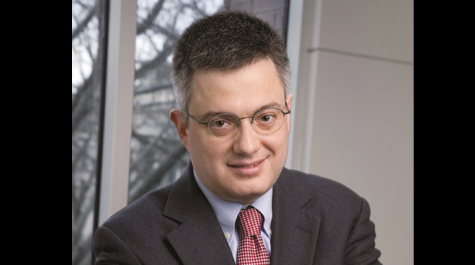William & Mary Law School to Honor Professor Henry Smith with Brigham-Kanner Property Rights Prize
* Please note that because of COVID-19, this year’s Brigham-Kanner Conference will be online only. Find out more on our events page.
______________
Professor Henry Smith, the Fessenden Professor of Law at Harvard Law School, will receive the 2020 Brigham-Kanner Property Rights Prize in October from the William & Mary Law School Property Rights Project. Smith will be honored during the project’s 17th annual Brigham-Kanner Property Rights Conference to be held at William & Mary Law School in Williamsburg, Virginia, on October 1-2.
The Brigham-Kanner Property Rights Prize is named in honor of the lifetime contributions to property rights of Toby Prince Brigham, founding partner of Brigham Moore, LLP, and Gideon Kanner, professor of law emeritus at Loyola Law School in Los Angeles. The prize is presented annually to a scholar, practitioner or jurist whose work affirms the fundamental importance of property rights.
Smith directs the Project on the Foundations of Private Law at Harvard Law School. When he joined the Harvard faculty in 2008, then Law Dean Elena Kagan praised him as “one of the nation’s leading lights in the crucial fields of property and intellectual property,” and one whose “scholarship is as original as it is rigorous, as brilliantly interdisciplinary as it is deeply rooted in law.”
Previously, Smith taught at the Northwestern University School of Law and was the Fred A. Johnston Professor of Property and Environmental Law at Yale Law School. He holds an A.B. from Harvard, a Ph.D. in Linguistics from Stanford, and a J.D. from Yale. After law school he clerked for the Hon. Ralph K. Winter, United States Court of Appeals for the Second Circuit.
Smith has written primarily on the law and economics of property and intellectual property, with a focus on how property-related institutions lower information costs and constrain strategic behavior. He teaches primarily in the areas of property, intellectual property, natural resources, remedies, and law and economics.
“Henry Smith fully warrants—and by a large margin—receipt of the Brigham-Kanner Property Rights prize,” said Robert C. Ellickson, the Walter E. Meyer Professor Emeritus of Property and Urban Law and Professorial Lecturer in Law at Yale Law School, and 2008 recipient of the Brigham-Kanner Prize. “Colleagues universally admire his scholarly achievements in the field, both conceptual and historical. Smith currently is the Reporter of the new Restatement (Fourth) of Property, a project likely to cement his eminence.”
Thomas W. Merrill, the Charles Evans Hughes Professor of Law at Columbia Law School and 2013 recipient of the Brigham-Kanner Prize considers Smith “an ideal choice” for the Brigham-Kanner prize and “a leading property theorist and author of an innovative property casebook.”
Smith’s books include The Oxford Introductions to U.S. Law: Property (2010, coauthored with Thomas Merrill); Property: Principles and Policies (3d ed., 2017, coauthored with Merrill); and Principles of Patent Law (7th ed., 2018, co-authored with John M. Golden, F. Scott Kieff and Pauline Newman). He is the co-editor of The Research Handbook on the Economics of Property Law (2011, with Kenneth Ayotte); Philosophical Foundations of Property Law (2013, with James Penner); and Perspectives on Property Law (4th ed., 2014, with Robert Ellickson and Carol M. Rose, the latter the recipient of the 2010 Brigham-Kanner Prize).
“Henry is a remarkable scholar,” said Joseph T. Waldo J.D. ’78, attorney and president of Waldo & Lyle, P.C., and co-chair of the annual Brigham-Kanner Property Rights Conference from 2004 to 2017. “He demonstrates the best qualities in the academy and is respected by those he works with. Most important he is a good listener.”
In 2015-16, Smith served as the President of the Society for Institutional and Organizational Economics, and in 2014, the American Law Institute named him Reporter for a Fourth Restatement of Property.
Sponsored by William & Mary Law School since its inception, the annual property rights conference has taken on a larger international perspective as more and more countries deal with property rights issues. In 2011, the conference was held at Tsinghua Law School in Beijing, China, and in 2016 at the Grotius Center of International Legal Studies at the World Court in The Hague, Netherlands. Future international events are being planned.
Previous recipients of the Property Rights Prize include Professor Frank I. Michelman of Harvard University (2004), Professor Richard Epstein of the New York University School of Law (2005), Professor James W. Ely, Jr., of Vanderbilt University (2006), Professor Margaret Jane Radin of the University of Michigan Law School (2007), Professor Robert C. Ellickson of Yale Law School (2008), Professor Richard E. Pipes of Harvard University (2009), Professor Carol Rose of the University of Arizona James E. Rogers College of Law (2010), retired Supreme Court Justice Sandra Day O’Connor (2011), Professor James E. Krier of the University of Michigan Law School (2012), Professor Thomas W. Merrill of Columbia Law School (2013), Michael M. Berger of Manatt, Phelps & Phillips (2014), Professor Joseph William Singer of Harvard Law School (2015), Hernando de Soto, president of the Institute for Liberty and Democracy, Lima, Peru (2016), David L. Callies of the University of Hawai’i at Mānoa William S. Richardson School of Law (2017), Stewart E. Sterk of the Benjamin N. Cardozo School of Law (2018), and Steven J. Eagle of the Antonin Scalia School of Law at George Mason University (2019).
To request a brochure about the Brigham-Kanner Property Rights Conference, or for more information about the event, please email Ali Trivette at mtrivette@wm.edu or call (757) 221-7466.
About William & Mary Law School
Thomas Jefferson founded William & Mary Law School in 1779 to train leaders for the new nation. Now in its third century, America's oldest law school continues its historic mission of educating citizen lawyers who are prepared both to lead and to serve.
